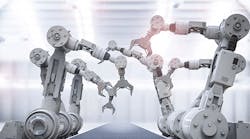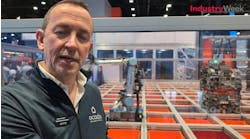Let's take it as a given that robots are going to be deployed in your warehouse soon, if they aren't already. The pundits seem to all agree that it's no longer a matter of if robots will take over some warehouse tasks; the question now is how will your human workforce react?
When it comes to warehouse robots, notes Kyle Landry, research associate with market intelligence firm Lux Research, there are two basic types of technologies: robots that are designed to assist humans, and robots that are meant to replace humans. In the short term, human-assisting technologies will be the most prevalent type, but in the long term, human-replacement technologies will become the more dominant trend.
"The holy grail of warehouse automation solutions is a product portfolio that can remove people from tedious logistics tasks, such as inventory tracking, product picking and material transport," Landry says. Humans tend not to be very good at highly repetitive tasks, agrees Seegrid's Jeff Christensen, and are better suited for creative and decision-making roles.
That's all well and good, but the idea that people will happily give up their jobs, tedious or not, to a robot isn't one that's been definitively proven out in the real-world workplace. In fact, according to a recent study conducted by MIT and Boston University, the use of industrial robots has had a large and negative impact on U.S. employment and wages in local labor markets.
The researchers—MIT's Daron Acemoglu and BU's Pascual Restrepo—estimate that in communities where robots were deployed in industrial applications, wages tended to go down. Every robot added per 1,000 workers reduces the employment-to-population ratio by between 0.18% to 0.34%, according to the study, with wages declining by 0.25% to 0.5%. The researchers also estimate that the wage gap between the top 90% earners and the bottom 10% has widened by as much as 1% between 1990 and 2007 (the period studied).
As you might expect, the popular media has had a field day with this study. Newsweek, for instance, warns that "Robots Are Coming After Our Blue-Collar Jobs," while the New York Times points alarmingly to "Evidence That Robots Are Winning the Race for American Jobs."
And the MIT/BU study is just part of a continuous stream of research into the possible effects of automation; a similar study by Oxford University a couple years ago concluded that almost half (47%) of all the jobs in the United States are at risk of being lost to automation within the next 20 years.
A recent IDC report takes a somewhat more positive approach to automation trends, suggesting that the growth of robots will also accelerate the talent race, increasing the average salary for robotics specialists by at least 60%. IDC also anticipates that the government will soon (by 2019) introduce robotics-specific regulations to help preserve jobs.
When you consider, though, that Treasury Secretary Steve Mnuchin recently opined that the idea that robots could significantly replace U.S. workers "isn't even on our radar screen," and that the Trump administration is steadfastly regulations-averse, it might be premature to expect any such robot regs in the near future, at least at the federal level.
It's also probably not much comfort to displaced workers to hear Tesla's Elon Musk proclaiming that humans need to somehow "merge" with robots and artificial intelligence to avoid becoming obsolete. Hard to imagine a world where humans themselves stand in the way of progress, but the notion of self-learning and "self-aware" robots is quickly shifting from pure science fiction to "maybe it could happen" status. It could be we're approaching a future where the robots will start anticipating supply chain patterns and send out "pull" signals on their own initiative. Maybe.
For now, though, the idea that automation leads to depressed wages, with the rich getting richer and the poor getting poorer, is developing into a political football that we'll no doubt hear more and more about as robots become even more widespread. Make sure you've got a good and appropriate answer when your workers (the human ones) start asking you if their current jobs are going to be automated out of existence.




